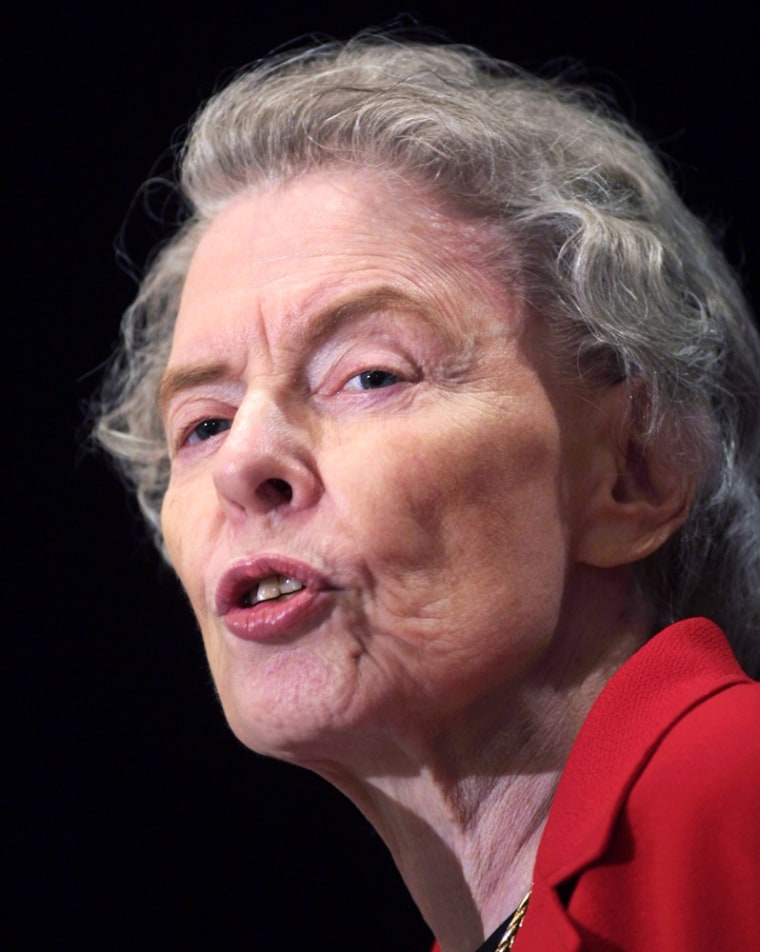Jeane J. Kirkpatrick, an unabashed apostle of Reagan era conservatism and the first woman U.S. ambassador to the United Nations, has died.
The death of the 80-year-old Kirkpatrick, who began her public life as a Hubert Humphrey Democrat, was announced Friday at the senior staff meeting of the U.S. mission to the United Nations and on the Web site of the American Enterprise Institute, where she had been a senior fellow.
Kirkpatrick's assistant, Andrea Harrington, said that she died in her sleep at home in Bethesda, Md. late Thursday. She had been suffering from heart disease, but the cause of death was not immediately known. U.N. Ambassador John Bolton asked for a moment of silence for Kirkpatrick Friday at a meeting of the U.S. delegation to the U.N. in New York.
Kirkpatrick's health had been in decline recently, Harrington said, adding that she was "basically confined to her house," going to work about once a week "and then less and less."
'A powerful moral voice'
Senate Majority Leader Bill Frist, R-Tenn., said that Kirkpatrick, who had a reputation as a blunt and acerbic advocate, "stood up for the interests of America while at the U.N., lent a powerful moral voice to the Reagan foreign policy and has been a source of wise counsel to our nation since leaving the government two decades ago."
Karlyn H. Bowman, a colleague of Kirkpatrick's at AEI, a conservative thinktank, called her "always insightful. Always interesting. Very thoughtful about modern American politics and foreign policy. A wonderful colleague."
Kirkpatrick, elevated to the U.N. post by President Reagan in 1981, was known as a blunt and sometimes acerbic advocate for her causes. She remained involved in public issues even though she'd left government service two decades ago. She joined seven other former U.N. ambassadors in 2005 in writing a letter to Congress telling lawmakers that their plan to withhold dues to force reform at the world body was misguided and would "create resentment, build animosity and actually strengthen opponents of reform."
Kirkpatrick was a political science professor at Georgetown University from 1957 until her appointment to the U.N. Like many conservatives, she wrote for Commentary Magazine, a liberal publication that gradually turned to conservatism amid liberals' criticism of Israel.
A pivotal article sought to draw a distinction between authoritarian governments and more extreme violators of human rights like the Soviet Union. She acknowledged that authoritarian states did not meet democratic standards, but wrote that they were far preferable to totalitarian regimes.
In the Reagan years she played a quiet role in cutting off U.S. aid to a leftist government in Nicaragua and supporting a military junta in El Salvador.
One of her more riveting moments at the United Nations occurred in September 1983 when she commissioned an audiovisual presentation there of the Soviet downing of a South Korean passenger plane, KAL 007, that had strayed into Soviet airspace. All 269 persons aboard died.
Alvin A. Snyder, producer of the video, revealed in 1996 that unedited versions of the tape disclosed that the Soviets thought the aircraft was an American RC-135 reconnaissance plane.
Her support for Israel, particularly at the United Nations where the Jewish state often is denounced, was steadfast.
In 2002, at a seminar in Washington sponsored by the Zionist Organization of America, Kikpatrick warned that a Palestinian state would be "a catastrophic mistake" and a danger to Israel. It would be appeasement, Kirkpatrick argued, and a step backward from the U.S. fight against terrorism.
'No patience with tyrannies'
Bill Bennett, a former secretary of education under Reagan, the nation's drug czar under the first President Bush, called her "very forceful, very strong, a daughter of Oklahoma, great sense of humor. She held her own."
Bennett said the Iraq Study Group so prominently in the news "would have been better with Jeane Kirkpatrick on it ... She had no patience with tyrannies, said they had to be confronted, you couldn't deal with tyrannies, that there were some people you could work with -- these people you couldn't."
Kirkpatrick once referred to herself as a "lifelong Democrat."
She actually switched to the GOP in early 1985, four years after Reagan sent her to New York for the U.N. job. She took with her a reputation as a hard-liner on foreign policy. Because of this, she often was a lightning rod for the opposition. In some respects, she shared Bolton's controversial profile. Bolton recently decided to resign when it became clear the Senate would not approve him full-time as U.N. ambassador.
Describing his work with Kirkpatrick at the American Enterprise Institute, Bolton told reporters Friday: "When I was at AEI in the late '90s for most of that time our offices were right next to each other and..." His voice then broke, and near tears he closed his eyes briefly, cleared his throat, and then continued in a quavering voice, "I benefited very greatly. It really is very sad for America, but she will be greatly missed."
When a reporter noted that Bolton and Kirkpatrick had very similar attitudes, he replied, "I don't really want to address that question."
Born Jeane Duane Jordan in Duncan, Okla., she was graduated from Barnard College in New York in 1948 and then received her master's and doctorate from Columbia.
During her early academic career she was a Marxist and joined the youth section of the Socialist Party of America.
Kirkpatrick considered seeking the Republican presidential nomination that went to George H. W. Bush in 1988. She stopped that process short, however, retreating to the position that she would accept the No. 2 slot if asked. She had played a leading role at the party's convention four years earlier -- at a time when she was still a Democrat.
She is survived by two sons, A third, Douglas, died earlier this year. Her husband of 40 years, Evron, died in 1995.
